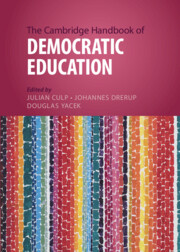Book contents
- The Cambridge Handbook of Democratic Education
- Cambridge Handbooks in Education
- The Cambridge Handbook of Democratic Education
- Copyright page
- Contents
- Contributors
- Acknowledgments
- Introduction
- Part One Historical Perspectives
- 2 Plato on Democratic Education
- 3 Aristotle on Education, Democracy, and Civic Friendship
- 4 Rousseau on Democratic Education
- 5 Dewey on Democratic Education
- 6 Hannah Arendt on the Very Possibility of Democratic Education
- 7 Paulo Freire on Democratic Education
- 8 Rabindranath Tagore on Democratic Education
- Part Two Philosophical and Normative Foundations
- Part Three Key Topics and Concepts
- Part Four Challenges
- Index
- References
8 - Rabindranath Tagore on Democratic Education
from Part One - Historical Perspectives
Published online by Cambridge University Press: 20 April 2023
- The Cambridge Handbook of Democratic Education
- Cambridge Handbooks in Education
- The Cambridge Handbook of Democratic Education
- Copyright page
- Contents
- Contributors
- Acknowledgments
- Introduction
- Part One Historical Perspectives
- 2 Plato on Democratic Education
- 3 Aristotle on Education, Democracy, and Civic Friendship
- 4 Rousseau on Democratic Education
- 5 Dewey on Democratic Education
- 6 Hannah Arendt on the Very Possibility of Democratic Education
- 7 Paulo Freire on Democratic Education
- 8 Rabindranath Tagore on Democratic Education
- Part Two Philosophical and Normative Foundations
- Part Three Key Topics and Concepts
- Part Four Challenges
- Index
- References
Summary
Rabindranath Tagore was a progressive educational philosopher whose ideas were far ahead of his time but are most relevant to the contemporary challenges of today. The first Asian Nobel Laureate, his cosmopolitan, democratic ideas, and experiments in education were pioneering. But he was primarily known as a literary genius, and his image as a mystical poet from the East obscured his educational vision and philosophy in the West. The purpose of education was to him the development of critical consciousness and of freedom not only from poverty and oppression, but of the mind from ignorance and prejudice. Strongly against British colonial rule he, nevertheless, loved English literature and music and admired Western science and technological developments. Although proud of India’s glorious past, he was strongly opposed to chauvinistic nationalism and imagined a world of unity of all peoples, a synthesis of the East and West. He built a university which would represent his international liberalism.
Keywords
- Type
- Chapter
- Information
- The Cambridge Handbook of Democratic Education , pp. 108 - 126Publisher: Cambridge University PressPrint publication year: 2023



